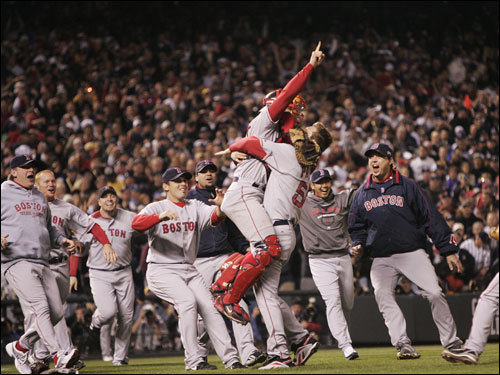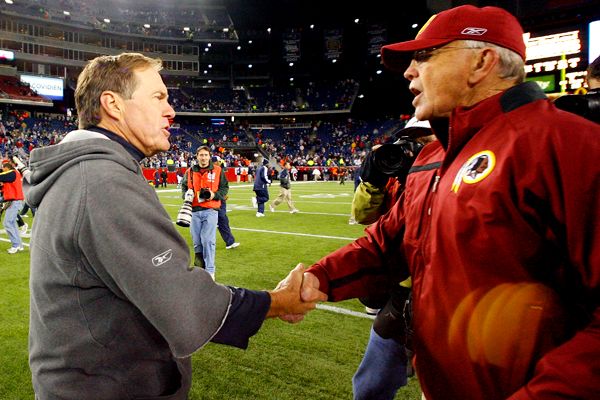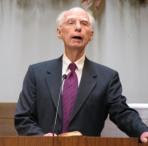 I have to admit it: I have a hard time sitting through a lot of sermons these days. I think there are a number of reasons for this predicament - as a preacher, myself, I always feel antsy about being the one sitting in the pew, listening to someone else - but I think the most fundamental reason for my struggle is the fact that, quite frankly, there is very little good preaching these days. I do not write this to insinuate that I am the best preacher in the world, but to share my concern that people are not hearing the Gospel.
I have to admit it: I have a hard time sitting through a lot of sermons these days. I think there are a number of reasons for this predicament - as a preacher, myself, I always feel antsy about being the one sitting in the pew, listening to someone else - but I think the most fundamental reason for my struggle is the fact that, quite frankly, there is very little good preaching these days. I do not write this to insinuate that I am the best preacher in the world, but to share my concern that people are not hearing the Gospel.First, a word is in order, though. These days, a movement has been gaining momentum that diminishes the preaching of the Word. Instead of having a "traditional" service where a preacher stands up and preaches, some congregations are moving in the direction of having less preaching, and more interactive programming - whether that be small groups, where everyone participates instead of one person preaching, or other forms of "artistic" services that neglect the straight-forward proclamation of the Word.
Not only do I think this is a bad idea, but I think it's unbiblical. Sixty-one times the New Testament utilizes the Greek word kerusso (which literally means "to preach," "proclaim," or "make known"). We are told that John the Baptist came preaching, Jesus preached, and Paul "solemnly charged" his understudy, Timothy, to "preach the Word" (2 Timothy 4:2).
Interestingly, history also shows us what happens when the Word is or is not preached. In his book, Feed My Sheep, the great H.M.S. Richards writes, "Read your church history. Read not only what the lines say, but read between the lines, and you will see that in every age the fortunes of the church of God on earth have risen or fallen with the fortunes of preaching. Wherever preaching came up, the welfare of the church came up; wherever preaching has gone down, the church has gone down" (p. 27).
He then writes, "There came a decline in religion in spite of the beautiful churches, and the beautiful music, and the beautiful liturgy, and the beautiful art," noting that revival only came when good preaching came. "God always had a man on fire with a message from heaven. And a revival came. Revival always comes through preaching" (pp. 27, 28).
So with all this in mind, why isn't there any good preaching - at a time in earth's history when we need good preaching more than ever?
Truth be told, in the last seven or eight years, I have probably heard, at most, ten preachers who I would consider to be good preachers. This, despite the fact that I've probably heard a couple hundred speakers in that time span. What amazes me the most, though, is the fact that some of the most well-known preachers - both inside and outside of Adventism - are not among those good preachers I've heard. It boggles my mind.
I don't know how many times there has been a "buzz" about so-and-so's preaching and I will download a few sermons by them and listen to it as I drive around in my car, only to be extremely disappointed by what I hear. Ultimately, I press "forward" and listen to the next sermon, only to be disappointed as well.
And it's not as though I am just an insecure preacher who is jealous of other people's recognition in preaching circles. I truly long to sit down and listen to a sermon where my heart can yell out a hearty "Amen!" Sadly, my heart usually does not.
Admittedly, I do have high standards. But it's not just because I'm a preacher and I "dissect" every other person's sermon and try to see how technically sound they are. For the most part, I don't care if a person follows their outline to a T, has three points - and three points only - and has a perfectly polished introduction and conclusion. I just want to hear the Gospel preached, in whatever shape or form that is packaged.
So, as I've reflected on where the good preaching has gone, here are some common characteristics of the "bad" preaching I've heard, and why it disappoints me:
1. Most sermons are laced with Old Covenant thinking. This is, in actuality, probably the biggest reason for poor preaching, which is prevalent in about 98% of sermons I hear. All the other reasons are very much secondary to this main reason.
For those of you who do not know what I mean by "Old Covenant," I would encourage you to read Skip MacCarty's recent book, In Granite or Ingrained? The term "Old Covenant"
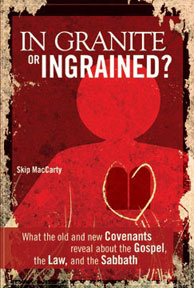 does not refer, first and foremost, to two dispensations in time, but two experiences that a person can have. The Old Covenant experience is a person making promises to God, while the New Covenant experience is a person believing God's promises to him or her. This is a very simple explanation of the concept.
does not refer, first and foremost, to two dispensations in time, but two experiences that a person can have. The Old Covenant experience is a person making promises to God, while the New Covenant experience is a person believing God's promises to him or her. This is a very simple explanation of the concept.When God promised Abraham a son, Genesis tells us that Abraham said "Amen!" to God (he believed God) and that was that. This was a New Covenant response - Abraham believed that God would fulfill His promise. However, a chapter later, Abraham entered into an Old Covenant experience when he tried to "help" God by sleeping with Hagar. Instead of believing God's promise, Abraham took matters into his own hands.
So how does this play out in a lot of preaching? Too many times we talk more about our responsibility as Christians than what Christ has already accomplished on our behalf. Instead of saying that God takes the initiative in our relationship with Him, for example, we tell people that it is their duty to wake up 15 minutes earlier each morning to pray and read their Bible.
We have sermons on "priorities," and how we, as Christians should make sure we have our priorities straight. We may even bring up a jar with sand in it, and show how rocks won't fit in the jar if there is already sand in it. Then we'll take the sand out, put the rocks in first, and then poor the sand in it, only to amazingly discover that it all fits if we prioritize!
And thus, if we only prioritize and make God first in our lives, then everything will work out and we'll be able to fit everything in.
Nice thought . . . but where's the motivation of the Gospel? Such a presentation is a nice little illustration, but what if, instead of saying the rocks represent time with God, they represent exercise or any other thing that's good for us? In other words, the fact that we throw God in there doesn't make it any more of a Christian - or biblical - concept.
Which leads me to my next point. . .
2. A lot of preaching is simply humanism cloaked in Christian language. I've heard whole sermons that sound like an advice column in my local newspaper, or a book that belongs in the "self-help" section of Barnes & Noble. Inherent in these sermons is the idea that if you just put your mind to it, you can accomplish anything with a little education, and a lot of hard work.
Have you ever heard a whole sermon that talked about, something to the effect of, "Ten steps to improving your marriage"? One of those steps may be "praying together," but even that can be humanistic if it is simply another step to achieving perfection.
Or how about, "Learning to forgive others"? The idea of forgiveness may sound like a biblical idea, for sure, but a whole sermon will be spent quoting the latest psychology or scientific data, but never once quote the Bible. The preacher will stand up and say, "We cannot forgive others, until we first forgive ourselves." That's a nice thought, but was it James or Peter that wrote that in one of their epistles? I haven't found it yet.
Sadly, if the Christian experience is simply a Twelve-Step program that is devoid of the motivation of the Gospel message, then it is simply humanism - the idea that human beings have some type of inherent goodness that they can uncover within themselves - masquerading around, taking the Lord's name in vain.
3. There's too much frosting. Admittedly, I am probably guilty of this myself, at times, but this is also a dangerous ditch to fall into. A preacher gets up and tells feel-good story after feel-good story - which may or may not be true - and then tells us that Jesus loves us.
One of the things I appreciate the most about Dwight Nelson's preaching - and his teaching - is his concept of the "Indicative" and the "Imperative." Every sermon, he says, must contain the
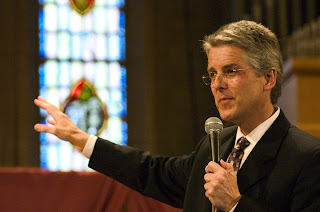 "indicative" (the done) and the "imperative" (the do). Most preaching is either one or the other, but very little of it is both. We must first tell our audiences what Christ has accomplished on His cross - He has secured salvation for humankind - and then we must tell them what their motivated response will be.
"indicative" (the done) and the "imperative" (the do). Most preaching is either one or the other, but very little of it is both. We must first tell our audiences what Christ has accomplished on His cross - He has secured salvation for humankind - and then we must tell them what their motivated response will be.One of my favorite illustrations for this concept is Nicolaus von Zinzendorf's conversion experience in the 18th century. While traveling around Europe as a teenager, he came across a painting that portrayed Christ, bleeding and gasping for His last breath on the cross. Underneath the painting, the sobering words read, "All this I did for thee; what doest thou for Me?"
That's the indicative and the imperative! Christ went to Calvary for us, what are we going to do in response to Him? In light of the indicative truth of the cross, paying tithe, giving up smoking, surrendering an addiction to pornography - all these things seem pretty easy to me. I am responding to Christ's indicative actions on Calvary, and I am willing to do anything for Him.
I cannot preach all frosting all the time - too much of it makes people want to vomit. Nor can I preach the imperative all the time - that's the epitome of Old Covenant thinking and it burns people out. But every call to action in my preaching must be couched in the indicative truth of Christ's accomplishments.
4. And, finally, many times I don't know what the preacher is trying to say. This is the one technical aspect that I will mention. Please, make your Big Idea abundantly clear! Don't have 17 points for a sermon. Don't even have three points, contrary to what many preaching professors tell you! Just try one point, and stick to that (contrary to this blog post!!).
One of my favorite quotes comes from the pen of the great C. S. Lewis: "I have come to the conviction that if you cannot translate your thoughts into uneducated language, then your thoughts were confused." This does not mean that a person cannot share deeper theological insights. It's just - try to simplify it for the common man. If you cannot, then you probably don't know what you're talking about to begin with.
Thank you for taking the time to read this whole thing. Sorry for the longness! If you've reached this point, congratulations! Again, I do not write these things to be critical, only to encourage people to preach the Gospel!
In essence, bad preaching is the result of a misunderstanding of the Gospel. That's really what it comes down to. I don't care if you're technically solid - if you don't understand the Gospel, your sermon will not connect. A person can dress up a dead man all he wants, but that ain't going to help him sing.
The same goes for sermons. We can dress them up all we want, but if the preacher doesn't have a fundamental understanding of the Gospel, then that sermon ain't going to sing.
Have a happy Sabbath.




